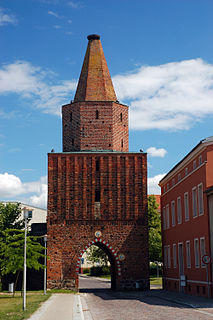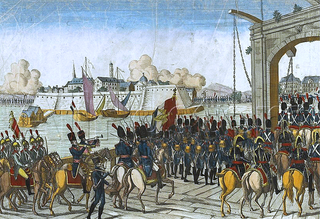
Johann Bonaventura von Rauch (25 July 1740 - 9 February 1814) was a Prussian Army major general. His sons Gustav, Leopold and Friedrich Wilhelm also took up military careers and became general as well.

Johann Bonaventura von Rauch (25 July 1740 - 9 February 1814) was a Prussian Army major general. His sons Gustav, Leopold and Friedrich Wilhelm also took up military careers and became general as well.
He was born in Peterskirchen/Oberbayern into a Bavarian family. His father was the teacher Johann Anton Rauch (c 1686–1745). He began his career in 1756 as a page at the court of the Principality of Brunswick-Wolfenbüttel and in 1761 became an engineer in the Brunswick Army. Under Charles William Ferdinand, Duke of Brunswick-Wolfenbüttel he took part in the closing phases of the Seven Years' War, namely in the 1761-62 sieges of Kassel (in which he was wounded), Meppen and Ziegenhain. In 1764 he was made a conductor in the Brunswick Engineer Corps, rising to lieutenant in 1766 and captain in 1772.
On Charles William Ferdinand's recommendation, Rauch moved to the Prussian Army in August 1777. On personal instructions from Frederick II of Prussia [1] he became a teacher at the mining corps in the Königsberg garrison. In 1788 Frederick William II of Prussia founded a Royal Engineering Academy in Potsdam - Rauch moved there and was promoted to major. The institution also took part in military surveying and so Rauch travelled to Silesia in 1791 and the Glatzer Schneegebirge in spring 1792. He also began to write treatises on military theory and to produce collections of maps.
He served as a captain of guides on the Prussian General Staff during the French campaign and helped take the fortresses at Longwy and Verdun. He then caught dysentery and stayed in a hospital in Koblenz until November 1792. The king made Rauch a lieutenant colonel in 1796 and put him in charge of the Engineering Academy. He became a major general in 1805 and was made deputy governor of Stettin on the outbreak of the War of the Fourth Coalition in summer 1806, with the 77-year-old lieutenant general von Romberg as governor. After the defeats in the battle of Jena-Auerstedt, Prussia's field army retreat and began to split up. Romberg's morale collapsed and when eight hundred French cavalry arrived before Stettin on 29 October 1806 he surrendered immediately without waiting to assess the size of the enemy force, which was vastly dwarfed by Stettin's garrison of 5,184.
Rauch agreed to the surrender [2] and so on 1 December was dishonourably discharged from the Prussian Army. He was later placed under house arrest and then in 1809 sentenced to life imprisonment in the Spandau Fortress. [3] His fate led to protests within Prussia's officer corps, especially since Romberg had only ever been a scientist and lecturer and had never before commanded an army in the field. Frederick William's queen-consort Louise of Mecklenburg-Strelitz took up the cause, but she was only able to get the sentence commuted to life imprisonment in the town of Spandau rather than the fortress, though she did also get half of Rauch's pension as a major general resintated.
In 1773 at Kunow, he married Johanna Bandel (1752–1828).
Bonaventura und Johanna von Rauch had ten children:

Gerhard Johann David von Scharnhorst was a Hanoverian-born general in Prussian service from 1801. As the first Chief of the Prussian General Staff, he was noted for his military theories, his reforms of the Prussian army, and his leadership during the Napoleonic Wars. Scharnhorst limited the use of corporal punishments, established promotion for merit, abolished the enrollment of foreigners, began the organization of a reserve army, and organized and simplified the military administration.

Friedrich Heinrich Ernst Graf von Wrangel was a Generalfeldmarschall of the Prussian Army.

Frederick Louis, Prince of Hohenlohe-Ingelfingen was a Prussian general.
Rauch may refer to:

Frederick William, Duke of Brunswick-Wolfenbüttel, was a German prince and Duke of Brunswick-Lüneburg and Oels. Nicknamed "The Black Duke", he was a military officer who led the Black Brunswickers against French domination in Germany. He briefly ruled the state of Brunswick-Wolfenbüttel from 1806 to 1807 and again from 1813 to 1815.

Karl Friedrich von dem Knesebeck was a Prussian field marshal and military adviser in the Napoleonic Wars, best known for designing the campaign plan of the Battle of the Nations and the subsequent invasion of France. As aide-de-camp to the king from 1813, and thereby his closest military advisor, he was a key figure in Prussia's military policy throughout the War of the Sixth Coalition and the subsequent Congress of Vienna.

Anton Wilhelm von L'Estocq was a Prussian cavalry general best known for his command of the Prussian troops at the Battle of Eylau.

The siege of Kolberg took place from March to 2 July 1807 during the War of the Fourth Coalition, part of the Napoleonic Wars. An army of the First French Empire and several foreign auxiliaries of France besieged the Prussian fortified town of Kolberg, the only remaining Prussian-held fortress in the Prussian province of Pomerania. The siege was not successful and was lifted upon the announcement of the peace of Tilsit.
Karl von der Gröben was a Prussian general.

Johann Justus Georg Gustav von Rauch was a Prussian general of the infantry and Minister of War from 1837 to 1841.
Franz Kasimir von Kleist was an infantry general of the Kingdom of Prussia. In 1806 as Governor of Magdeburg he capitulated to Napoleon's troops, for which he was posthumously condemned to death.

The Capitulation of Pasewalk on 29 October 1806 resulted in the surrender of Oberst (Colonel) von Hagen's 4,200 Prussian soldiers to an inferior force of two French light cavalry brigades led by Generals of Brigade Édouard Jean Baptiste Milhaud and Antoine Lasalle. The Prussians were completely demoralized after a two-week-long retreat following their decisive defeat at the Battle of Jena-Auerstedt. Pasewalk is 110 kilometers north of Berlin and about 40 kilometers west of Szczecin (Stettin), Poland.

In the Capitulation of Stettin on 29–30 October 1806, Lieutenant General Friedrich Gisbert Wilhelm von Romberg surrendered the garrison and fortress to a much smaller French light cavalry brigade led by General of Brigade Antoine Lasalle. This event was one of a number of surrenders by demoralized Prussian soldiers to equal or inferior French forces after their disastrous defeat at the Battle of Jena-Auerstedt on 14 October. Stettin, now Szczecin, Poland, is a port city on the Oder River near the Baltic Sea, about 120 kilometres (75 mi) northeast of Berlin.
Friedrich Gisbert Wilhelm Freiherr von Romberg was a German officer who rose to lieutenant general (Generalleutnant) in the Prussian Army. As governor of Stettin in 1806, he surrendered without a fight, for which he was sentenced to life imprisonment by a Prussian military tribunal.

Gustav Adolf Leopold von Rauch was a major general in the Prussian Army.

Friedrich Wilhelm von Rauch was a lieutenant general in the Prussian Army. Born in Potsdam, he was the son of major general Bonaventura von Rauch and took part in the War of the Fourth Coalition. He served as an adjutant general to King Frederick William IV of Prussia and as Prussia's military attaché at the Russian court of Emperor Nicholas I. He died in Berlin. His restored tomb monument is still there in the Invalids´ Cemetry. His sons Alfred Bonaventura and Friedrich Wilhelm von Rauch also became generals.

Born into an aristocratic Prussian family, Albert Gustav Guido von Rauch was a general of the infantry in the Prussian Army who fought in the Austro-Prussian War and Franco-Prussian War.
Gustav Adolf von Rauch retired in 1854 as a cavalry officer with the rank of major in the Prussian Gardes du Corps regiment, to act as chamberlain and court-marshal to Princess Louise of Prussia, wife of Alexis, Landgrave of Hesse-Philippsthal-Barchfeld, who have been divorced since 1861, in the following decades at Berlin´s Monbijou Palace. Rauch was a distinguished collector of ancient Greek and Roman coins and from 1870 to 1877 chairman of the Numismatic Society in Berlin.

Friedrich Leopold Bonaventura von Rauch was a Prussian general of the cavalry and born into an aristocratic Prussian family with a long history of military service.

Alfred Bonaventura von Rauch was a general of the cavalry in the Prussian Army and an amateur jockey. He was born in Potsdam and died in Berlin.